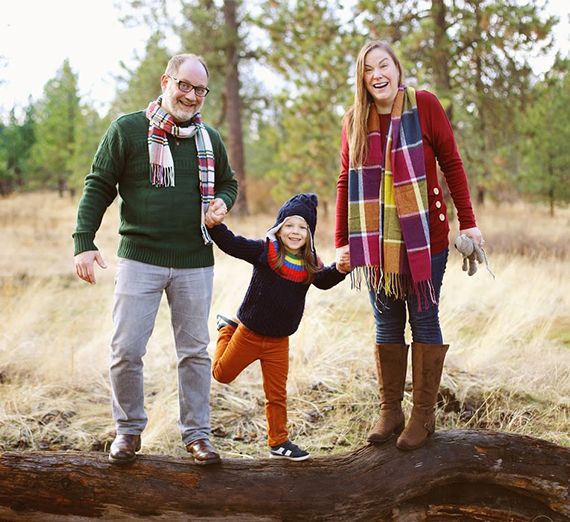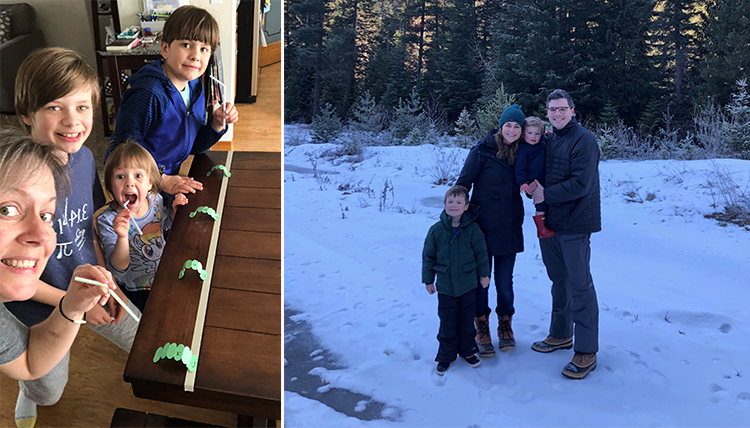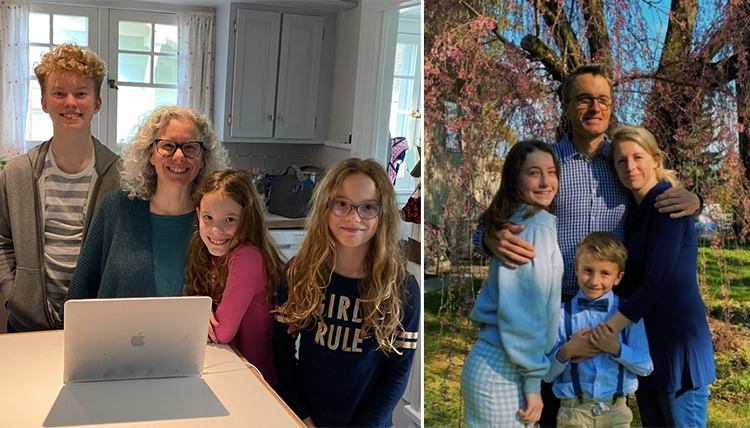Working from home with kids

Working from home during the pandemic, with kids of your own, is like, well, we’ll let six colleagues fill in the blanks.
Phoebe & David Oosterhuis
Business manager, Community Engagement; chair/associate professor, Classical Civilizations
The pandemic has made this couple realize the importance of childcare. They have managed caring for their 4-year-old son, but many are not that fortunate.
The Oosterhuises created a fairly complicated spread sheet – imagine the football coach on the sideline with every play typed on a laminated card – laying out their schedules for the week.
“It has required us to be really creative and flexible in how we do our jobs and care for, and educate, our son,” says Phoebe. “I find myself asking, ‘How can we go for a walk and work in some math?’ or ‘How can we do an art project and mix in language skills?’”
“It feels like (son) Jack is a football we pass off to each other during the day, each of us trying to do our job well and still be a good parent, working with him to practice his numbers and letters, and all that he’s supposed to be doing,” David says.
David teaches classes remotely, creating materials to fully engage his students and recording his lectures so that class time can be spent on discussion. He video tapes himself grading tests and explains incorrect answers so that students can learn.
Phoebe’s job is split between the office and home, often stretching her work week to nights and weekends to fit it all in.
Perhaps the biggest challenge is finding personal time. If either aren’t working, they’re caring for Jack. There just isn’t time for each other, or for themselves. But all this has made them feel lucky. “We both have jobs and we are able to work remotely and keep our family safe,” David says.
Melissa Click
Associate professor, Communications Studies
“My tendency when faced with chaos is to make schedules and lists. My partner also teaches at Gonzaga, so we are both somewhat flexible,” Click says. They have a master calendar for what needs to be done each day for themselves, her 9th grade son and her twin 5th grade girls.
“My partner and I have decided one of us should be outside the house every day for our own sanity. I teach communications, so I realize how important it is in our house.
They both teach remotely to stay safe. “We knew we couldn’t afford to get sick. Even before the pandemic, being a working mother means you fail at everything you do, and you never feel you do your best at the things most important to you. But somehow I’m balancing it all OK,” says the mother-in-chief.
She takes a walk in the morning before the kids have risen, gets snacks set out and computers turned on and ready.
Are things getting any easier? “I don’t want to jinx this, but yes. I feel like I have a pretty good grip on teaching my Gonzaga classes and tending to my children at home. I’m always reminded to stay flexible,” Click says.
“I praised my students in Comm 100 last fall for adapting so well to our current circumstances. They showed up every day. We were silly some days, serious on others. It was one of my best classes ever. I think students just want some semblance of normal again. And they want to feel connected,” Click says.
That said, one of Click’s most significant sources of joy is a tighter connection with her own kids. “When one of them tells me what they just learned or asks for a hug, I’m there for them.”
That carries over into her virtual classroom. “I got a note from a student at the end of last semester saying she had struggled but my class kept her going.”
Click decided to learn Spanish during the pandemic to keep her mind active and off more depressing issues. She and her children also picked people they knew to write handwritten letters to, one each week. And they’ve found great excitement in checking the mailbox for letters back from their friends and family.
Above left: Melissa Click and family. Above right: Shannon Dunn and family.
Shannon Dunn, Associate professor, Religious Studies
Spirit caught up with Dunn as she and her husband were pulling through a McDonald’s drive-through to grab dinner to take back to their hotel room, where they were stationed during the windstorm that knocked out their power for several days. Par for the coronavirus course, eh!
While Dunn teaches remotely, she likes to get away to her in-laws’ basement, or to campus where she won’t be interrupted. She and her husband have a high school daughter and a 3rd-grade son. She finds the pandemic is more manageable now than in those early days. “I know what to expect, and so do my students and my own kids,” she says. “I do miss the energy of the in-person classroom, but my students have been great, really intentional about using our online platform well. At the same time, it takes a lot of energy to support the emotional wellbeing of my students and my kids.”
She misses having time tor herself, to read and to think. She does try to walk every day, and “my dogs are great about forcing me out of the house,” she says. “I have so much planned out long range, but it’s been tough to put any plans in place right now. But I’m hopeful.”
“We have so much to be grateful for, the resources to deal with the pandemic, and our kids have access to online schools. Initially, the pandemic brought us closer as a family unit, and it, along with our social justice, economic and political issues, has reminded me of the importance of my work and that of the academy. We’re teaching students to ask critical questions about the good life, and what it means to flourish. It has given me a renewed commitment to my job,” Dunn says.
Holly Jones
Communications specialist, University Advancement
For Jones’ three kiddos, sons in 7th and 6th grade, and a daughter in kindergarten, the realization that remote school probably means no more snow days was devastating. So, Jones is counselor, as well as IT specialist, teacher’s aide, lunch lady and recess supervisor. In order to accomplish these essential functions, as well as her Gonzaga work, “I stretch my day out quite a lot. It’s no longer an 8-hour work day with two breaks and an hour lunch. I have to be far more intentional with claiming personal time for myself. Being on duty 24-7 can eat you up,” she has found.
When the pandemic took root and everyone worked from home in those early stages, “the workload became much heavier and we had to get things done quicker,” she explains. “A lot of initiatives had to be funded, and work accelerated. In the beginning, it was overwhelming and a big adjustment, but I understood it. I didn’t have the rhythm and stability I have now. Initially, I felt a need to prove that I was working from home, and overcome society’s perception that if you’re working from home you’re not really working.
“But I’ve had an opportunity to try new things, have had good conversations with my supervisors and other department leaders, and the clarity about expectations is much better now. I realized I don’t need to over-produce to feel like I’m meeting expectations. Having good supervisors created an environment where my work and time is respected, and they understand my time pressures with kids at home. I’m very grateful.”
One of the things Jones misses most is hot coffee at any time of the day, explaining the coffee in the office is always hot, but not so in her own kitchen.
Of course, Zoom has become our primary communication link with colleagues. Jones was on a Zoom meeting when she heard a clatter downstairs. There was laughing and squealing. “I tried to listen intently to my meeting, but my attention was drawn to the increasing noise from my house. I yelled to my kids, ‘Please quiet down’ at the top of my lungs. I went back to my meeting, and found everyone’s eyes so big. I realized as they laughed that I had muted my speakers, not my microphone.”

Above left: Jones and family. Above right: Brajcich and family.
Andrew Brajcich, Associate accounting professor/director, Graduate Accounting
“It’s total chaos at home, which can be taxing. (Get it? I teach tax . . . don’t worry, I’ll be here all semester.)” Brajcich is a morning guy, so he’s up at 5:30 a.m. when his youngest of two boys, ages 2 and 5, awakes. He’s on kid duty until 9 when he leaves for the office, and works until 4 or 5 before heading home. He calls his wife ‘amazing.’
“It’s difficult for me to work from home in our 1,200-square-foot house. If daddy is in sight, he’s available. Plus, we have a small pre-school pod in our basement which took up any potential home office space. So once every few weeks I go to bed as soon as we put our boys down and head into the office about 3 a.m. to catch up on my backlog of work. I picked a bad year to stop drinking coffee,” Brajcich says.
He worries that his boys are missing social development when they rarely see facial expressions of anyone outside the family or on TV. He’s grateful for his wife and his colleagues, both providing him with a growth experience and confidence builder. His in-laws chipped in, getting him a reclining office chair so he can take a nap if he needs it during the day.
“That’s about as crazy as we get in accounting.”

